Foreign Travel Tips For Dialysis Patients
May 09, 2017, 12:25pm EDT

- For domestic travel, start making arrangements with a dialysis center in the city you are planning to visit at least 30 days before departure. For foreign travel, getting started even earlier is a good idea. Generally, dialysis centers are welcoming to travelers, within the context of their capacities. Patients know how hard it is to secure favored chair times in their local centers. Patients travelling abroad should plan on encountering some less desirable times.
- Travelling with a cycler is possible but always keep a Plan B in mind in case a problem develops. Repair services are few in foreign markets and non-existent aboard a cruise liner in the middle of the ocean.
- If you’re planning to visit relatives abroad, start the search for a dialysis center by asking friends and family for recommendations. If not, try the good old Google search or ask your dialysis center for help.
- Make sure you ask your dialysis center for a packet of information containing your dialysis order and recent lab work. This gives the foreign dialysis center a place to start in providing care.
- Keep in mind that if you plan on being gone for more than 30 days, many dialysis centers will not hold your chair. You will have to go through the re-admission process once you return, including a review of finances plus new lab work and a visit with a doctor.
- Check with all your other doctors before you travel and carry telephone numbers for all their medical providers in case of emergency.
- Make sure you have an ample supply of all medications. Travelling with medications in the original pharmacy bottle with the prescribing doctor’s name on the label should cut down on any confusion at the border.
- International travel takes planning for supplies to be shipped. These arrangements usually take months of planning. Some companies don’t ship to other countries. Others require the signature of a doctor in the country you are visiting.


How to Travel While on Dialysis
When most people think about dialysis, they imagine a person hooked up to a machine in a hospital setting.
When most people think about dialysis , they imagine a person hooked up to a machine in a hospital setting. However, being on dialysis doesn’t mean you have to stay close to your dialysis. Those who need dialysis can still enjoy traveling and seeing loved ones. While traveling on dialysis may be tricky, it’s not impossible. There are many ways to make sure your travels go smoothly. So don’t let your kidney function get in the way of exploring all the world has to offer – there are ways to travel while on dialysis.
Is it Safe to Travel While on Dialysis?
If you receive dialysis, you should always consult with your physician before planning to travel. However, according to the National Kidney Foundation , “most patients who receive dialysis or have had a kidney transplant can travel safely and continue their treatment while away from home.”
Options for Traveling on Dialysis
One option for traveling on dialysis is to use a home dialysis unit . A home dialysis unit is a small, portable dialysis machine that can be used in a hotel room or even on an airplane . Home dialysis units allow you to have more control over your dialysis treatments and may make traveling easier.
If you choose to travel with your dialysis unit, you should still be aware of the closest dialysis center on your tip in case you need assistance.
Another option for traveling on dialysis is to use a dialysis center in the area you’re visiting. This may require some research ahead of time but can save you from having to lug a dialysis machine with you on your trip. Many dialysis centers have staff who are familiar with travelers and will assist you in ensuring your dialysis treatments go smoothly. In order to receive treatments at a dialysis center while you’re traveling, the center will likely need the following information:
- Your dialysis access type
- Recent dialysis treatment records
- Your dialysis prescription
- The dates and times you’ll need dialysis treatments
- Your insurance information
- A list of any medications you take during dialysis
- Recent lab results
How to Prepare for Traveling on Dialysis
Whether you are traveling for business or pleasure, there are a few things you should do to prepare for your trip. First, you should check with your dialysis center or home dialysis unit supplier to confirm you have all the supplies you need for your trip.
If you are traveling with your dialysis machine, make sure it is in good working order. Most dialysis equipment will have toll-free numbers you can call for 24/7 assistance. Keep these numbers with you at all times.
Remember to pack a copy of your medical records and have your doctor’s contact information readily available. Maintaining an appropriate diet is also important when traveling on dialysis. Therefore, you may want to pack healthy snacks and meals for your travel.
Lastly, if you choose to use a dialysis center in your destination city, be sure to call in advance and let them know when you will be arriving.
Things to Consider When Traveling on Dialysis
While traveling can be fun, it may be quite demanding. As a result, it’s important to remember to take care of yourself. This is especially true if you are traveling on dialysis. Be sure to get plenty of rest and drink lots of fluids. Moreover, it is imperative to stick to a strict dialysis schedule while on the road. That means dialyzing as often as you normally would and following your usual diet. Missing dialysis treatments can be dangerous and even life-threatening. That being said, including time for treatments in your travel plans is essential. If you have any questions or concerns about traveling on dialysis, talk to your doctor. They can help you make a plan to ensure your travels go as seamlessly as possible.
What to Do if You Have an Emergency While Traveling
With the right equipment and guidance, traveling on dialysis is possible and can even be enjoyable. However, it’s crucial to be prepared for anything. That means knowing what to do in an emergency . If you are using a home dialysis machine, it is vital to pack all the supplies you need.
Having the contact information of a nearby dialysis center is also necessary. Sometimes things happen unexpectedly. A dialysis center can assist you in getting the supplies and treatments you need. As mentioned before, it’s also a good idea to have your doctor’s contact information and other emergency contacts with you while you travel. That way, if you have any questions or problems, you can easily get in touch with someone who can help.
Traveling with Peritoneal Dialysis
Patients on peritoneal dialysis may have an easier time traveling because they are not dependent on dialysis units. However, it is still important that you plan ahead before your trip. Make sure you contact your doctor and a dialysis center in your destination city and make sure they can accommodate you in case a problem arises.
Visit The Kidney and Hypertension Center Before You Travel
The best way to ensure a smooth and enjoyable trip is to plan ahead. At the Kidney and Hypertension Center, we can help you make a plan for your dialysis treatments during your travels. Start planning your next trip and book an appointment with the Kidney and Hypertension Center today.

4 Tips to Improve Kidney Health this Summer
The summer season is a time when many people enjoy vacations, picnics, and outdoor activities.…
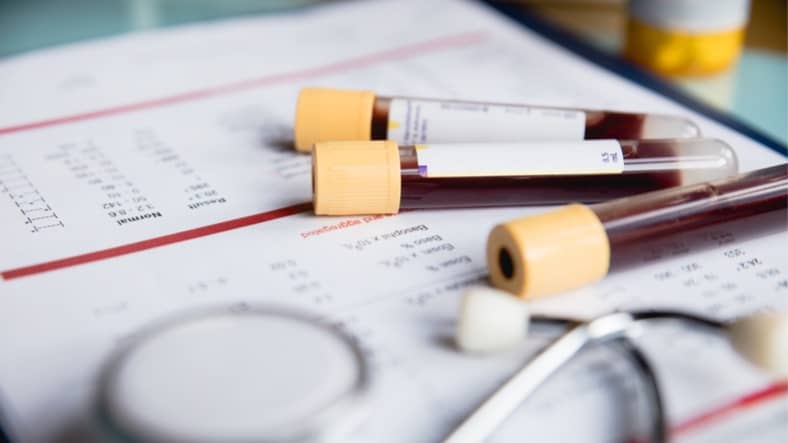
Interpreting Your Laboratory Results
One of the most common reasons to see a kidney specialist is for elevated creatinine…
The Link Between Heart Disease and Kidney Disease
Did you know that kidney disease is a risk factor for heart attacks and strokes?…
Schedule Appointment
" * " indicates required fields
1-833-24RENAL / 1-833-247-3625
- Conditions & Treatments
- Our Providers
- Patient Education
- Patient Forms
- Patient FAQ
- Pay My Bill
- Patient Portal
- Appointments
- Resource Center
Need help? Call 1-888-373-1470
Find a Dialysis Center
- Understanding Chronic Kidney Disease
- Kidney Disease Stages
- What Is a Nephrologist?
- What to Expect with CKD
- Kidney Disease Management
- Managing Medications
- Understanding Acute Kidney Injury
- How Kidneys Work
- Take a FREE CLASS on Kidney Disease
- Dialysis Basics
- Dialysis Medications
- Benefits of Home Dialysis
- Talk to a Home Dialysis Expert
- Home Peritoneal Dialysis
- Home Hemodialysis
- In-Center Hemodialysis
- Insurance & Managing Costs
- Choosing Not to Treat
- Your Emotional Health While on Dialysis
- Staying Engaged
- Staying Healthy
- Dialysis Travel Services and Information
- Tips for Loved Ones
- Managing Your Diet
- Fluid Management on Dialysis
- Dialysis Diet Planning
- Diet & Nutrition
- I Have Kidney Disease
- I’m Preparing For Dialysis
- I’m on Dialysis
- Request Patient Travel Services Information
- Sign Up for Our Newsletter
- Risk Factors
- Diagnosis and Testing
- GFR Calculator
- Kidney Diet Basics
- Your Kidney Care Team
- High Blood Pressure
- Acute Kidney Injury Treatment and Recovery
- How Does a Hemodialysis Machine Work
- Starting Dialysis
- Types of Dialysis Access
- Your Care Plan
- Monitoring Your Lab Results
- Phosphate Binders
- What to Expect
- Getting Prepared
- PD Training
- PD Monitoring
- Your Care Team
- HD Training
- HD Monitoring
- In-Center Treatment Options
- Types of Vascular Access for Hemodialysis
- How to Choose a Center
- Finding a Kidney Donor
- Considering Kidney Donation
- Free Transplant Guide
- Understanding Medicare Coverage
- Understanding Medicare Advantage
- Understanding Employer Plans
- Managing Your Emotions
- Talking About Dialysis
- Body Image and Dialysis
- Building Your Dialysis Support Network
- Tips for Working While on Dialysis
- In-Center Activities
- Managing Your Time on Dialysis
- Dialysis & Exercise
- Weight Management
- Avoiding Infection
- Managing Multiple Conditions
- Fighting the Flu
- At-Home Hemodialysis
- At-Home Peritoneal Dialysis
- Eating Well on a CKD Diet
- Eating Well on a Dialysis Diet
- Salt and Kidney Disease
- Potassium and Kidney Disease
- Phosphorus and Kidney Disease
- Talking With Your Dietitian
- Kidney-Friendly Shopping
- Kidney-Friendly Holiday Recipes
Plan Your Dialysis Travel With Us
We know planning for dialysis while traveling takes additional coordination—let us help. We are here to support you so you can live life to its fullest. The Fresenius Kidney Care Patient Travel Services team can help you find Fresenius Medical Care dialysis centers and will schedule appointments to make traveling easier.
Treatment coordination services are provided free of charge for those currently using Fresenius Medical Care centers and those who would like to use our services while traveling.
To start planning for your travel needs, call 1-866-434-2597 (option 2) , Monday – Friday, or fill out the form below and one of our team members will contact you.
Please provide at least 2 weeks’-notice for domestic travel and 8 weeks for International travel. Advance notice necessary for proper planning and coordination pending in-center availability at your travel destination.

- Facility Development
- Clinical Operations
- Administrative Services
Traveling on Dialysis

When you’ve been diagnosed with End Stage Renal Disease (ESRD), it can make things you used to enjoy, such as travelling, much more difficult. You may have dreamed of traveling during retirement, or you have a family event away from home you really want to go to. You may even have a work conference, or a family emergency, such as illness or even death, that requires you travel. Contrary to what you may think, it is possible to travel while receiving dialysis treatment, and this article goes over some guidance on how to do that.
What to know before you travel
Before planning a trip, it’s important to talk to your doctor and other members of your care team to make sure they believe you are okay to travel. While many doctors encourage it whenever possible, they want to make sure your health is stable first. Once you’ve been given the okay to go on a trip, you will likely be able to talk to someone at your dialysis center about helping you arrange dialysis treatment when you’re away from home. This is known as transient dialysis. Talk to your nurse or social worker to find out if there is someone who can help you in making arrangements.
Whenever possible, you want to start trying to plan your trip at least six to eight weeks in advance, and being flexible about your dates can be helpful in peak seasons. You and/or your coordinator may also need to contact more than one center to find one that can accommodate with you. Once you’ve found a center that can take care of you on your trip, take some time to ask them any questions you may have such as:
- What are the hours the dialysis center are open?
- Does the center reuse dialyzers or bloodlines?
- Can they use the same kind of dialyzer you use at your home center?
- Can you eat and drink while on dialysis?
- How many patients are assigned to each nurse or patient care technician?
In the event of trip that needs to be made quickly due to a family illness or death, most centers do everything they can to accommodate patients in this situation. Dialysis records can be faxed ahead or you can bring them with you.
What information does my transient dialysis center need?
Most dialysis centers will need the following information to safely provide dialysis to you while you’re traveling:
- The dates you need treatment
- You name, address, and other key personal information
- Your medical history and recent physical exam reports
- Recent lab results
- Recent chest X-ray
- Your dialysis prescription and 3-5 recent treatment records
- Dialysis access type
- Special needs or dialysis requirements
- Information about your general health
- Insurance information
- Where you will be staying the area
- A list of the medications you take during treatment and at home
Will my insurance cover the dialysis I need while traveling?
A big and important question you may have when thinking about traveling on dialysis is likely insurance and if they’ll cover the treatment you need while out of town. If you have Medicare as your primary insurance, Medicare will pay for 80 percent of your treatment costs within the US and US territories. The 20 percent not covered will be your responsibility, but if you have a secondary insurance, it may help to cover some or all of that 20 percent not covered by Medicare.
If you have a commercial form of insurance, the best way to find out what they will and won’t cover is to talk to them and find out what they will cover. Requesting a letter stating they will pay for your treatment at a transient dialysis center can help to make sure you have exactly what they will cover in writing. Some commercial insurances will not pay for treatment outside of the US, and planning ahead in this situation really is crucial.
Taking care of yourself while traveling
In addition to arranging dialysis care, it’s important to remember not to overdo it while you’re away. You are still struggling with a chronic condition and need to keep that in mind. In case you do get sick:
- Make contact with the doctor at your transient center as soon as you can.
- Make sure your family knows your travel plans.
- Keep important phone numbers with names like your regular doctor, dialysis center, etc.
- Keep a copy of your medical records with you when you’re traveling.
- Inform anyone travelling with you on where you keep your records and what your medical needs are.
- Bring enough of the medications you need to take to last the entire trip. Make sure to account for emergencies such as losing your luggage or a spill. You can also carry written prescriptions as a safeguard too.
Health Systems Management, a dialysis management company, is based in Tifton, Georgia. Our company provides turnkey dialysis management services to Atrium Health Wake Forest Baptist dialysis clinics in North Carolina and Emory Healthcare dialysis clinics in the Atlanta, Georgia area. For more information about Health Systems Management, our locations and job openings for RNs, LPNs, PCTs and CCHTs please visit: healthsystemsinc.com
Source: Kidney.org
- Employee Login
- Partner With Us

- Traveling While on Dialysis
Many patients enjoy traveling during the summer and fall. If you are planning on taking a trip in the next few months, remember to speak with your Patient Service Representative or Social Worker. Please have the following information ready so that your trip can be planned in a timely manner:
- the dates you would like to be out of town
- the address of where you will be staying
- an out of town contact phone number so that the out of town dialysis center can reach you ( a cell phone you take with you is OK)
- your insurance information
Once this information is received we will contact dialysis centers closest to where you plan to stay to see if they have an opening during the dates that you will be traveling. Sometimes we can not get you into the closest center, especially during holiday weeks. Once a center informs us that they have an opening, we send them your dialysis orders and medical information so that your dialysis can be completed just as your physician has prescribed. Some centers request information that we do not routinely require. You may need to get a chest x-ray, EKG, HIV test, or TB test prior to going to a specific center. Since we don’t know which centers require extra tests until they are contacted, it is important that you begin your travel planning about 4 weeks in advance.
Medicare will pay for dialysis anywhere in the USA. They do not pay for dialysis on a Dialysis Cruise Ship. If you would like to travel to Canada or Mexico, some patients have found it cheaper to stay in a US city on the border and take day trips into Canada and Mexico.
If your employer group coverage or private insurance will be paying for the trip it is important to contact your carrier to see if there are specific centers that they want you to use. Following the regulations of your insurance carrier will minimize any out of pocket costs that they may charge you.
If you have Ohio Medicaid, it will only pay for routine dialysis in OH. If you travel out of OH you will need to pay the out of town dialysis center any amount that Medicaid would normally have been charged. They usually want this payment prior to your dialysis appointment.
Patient Resources
- Transient Patients
- Dialysis Social Work Services
- Health Care Power of Attorney
- The Living Will Declaration
- The Social Security Trial Work Period
- Recommended Links
- Patient Newsletters

American Association of Kidney Patients
International Travel While on Dialysis
By Barbara Wallace, Renal Dialysis Nurse, and Deborah Pelaez, AAKP Marketing and Communications Manager
At AAKP, we know how important quality of life is for kidney patients, including those on dialysis. Planning a vacation away from home can seem like a daunting task. This article was written to help those who are considering not just a vacation, but an International vacation while on dialysis. AAKP interviewed international dialysis nurse, Barbara Wallace, co-owner of Irish Holiday Dialysis, to learn about important things to consider when planning a trip abroad including a Top 10 List, which you will find highlighted below.
Choosing a Vacation Destination
So, you have decided to plan an International vacation while on dialysis. How will you decide where to go? Maybe you’ve always dreamed about traveling somewhere like Paris or Ireland, but before you book that trip there are many things to consider.
First, Barbara suggests choosing a vacation destination in a country with a reputation for high quality healthcare and with clinics that have similar high standards to your own center. This will ease your mind and make many of the other travel decisions easier.
Additionally, she encourages patients to talk to their clinic’s social worker or patient concierge to ask for help when planning as well. You don’t have to plan alone, there are many people and resources to help you. Your social worker may have additional resources and services for you, but Barbara recommends these websites when investigating International travel destinations with dialysis clinics:
Travel Resources
https://www.booknowmed.com/ – An online booking engine for international travel dialysis, allowing users to check availability, cost and book dialysis in real time. It is non-promotional and free of charge for the patient.
https://traveldialysisreview.com/ – This website is run by a group of dialysis patients who like to travel internationally. It is a very honest website that shares good and bad reviews. This website also offers a travel blog.
http://www.globaldialysis.com/ – A long established website for dialysis and travel with a database of thousands of international clinics and lots of practical travel advise.
If this is your first international vacation while on dialysis, you may also want to choose a country where there is no language barrier. Furthermore, Barbara suggests choosing a country with established tourism links with the U.S. She says that this makes planning much easier, such as finding direct flights, travel reviews and more.
Planning for your Trip – Important Information
Allow time for the clinic you choose internationally to receive all your medical information. This could take about one month. Your physician will need to deem you fit to travel. Most international clinics will require a letter of consent, as well as all medical records in advance. All records should be sent electronically and securely between your home clinic and holiday clinic well in advance. You will not usually need to bring any medical records with you when travelling – care should be taken with your personal data. Diabetics should bring blood sugar records.
Dialysis Treatment Internationally – What to Expect
Dialysis patients get to see a side of a country that few people get to see – the medical side. The aim at any clinic is to give you the exact same treatment as you would at home. The dialysis machine may be a different model, but it can be programmed to your specific prescription. Any slight difference there may be will be identified in the planning stage. You should travel in confidence, with no worries about safety, and trusting you will get the same type of treatment.
After planning your trip in confidence using these tips and pointers, we wish you safe travels and remember to enjoy what a holiday is all about – enjoy the culture, the people, the country you are going to and enjoy the ones you are with.
This article was originally published in aakpRENALIFE, May 2019.
Share this:

Please enter your contact information here:
Your Name (required)
Your Email (required)
Your Message ...

- What Is Kidney Disease?
- Symptoms of Kidney Disease
- Stages of Kidney Disease
- Causes of Kidney Disease
- Diagnosis of Kidney Disease
- Pediatric Kidney Disease
- Early Intervention
Hemodialysis
Peritoneal dialysis.
- Kidney Transplant
- Costs for Treatment
- Immunizations
- Staying Healthy
- Reading Food Labels
- Nutritional Guidelines
- Cooking at Home
- Food Substitutions
- Diabetes Diet and Kidney Disease
- Quality of Life
- Physical Health
- Mental Health
- Stress Management
- Humor and Laughter
- Sex and Intimacy
- Fact Sheets
- Online Courses
- Spanish Resources
- State-by-State Resources
- Additional Resources
- Magazine: The Kidney Citizen
- Travel Considerations
- Equipment Needed
- Benefits and Challenges
- Staying Healthy on PD
Back to Dialysis

Increased Flexibility
One of the greatest advantages of peritoneal dialysis (PD) is the increased ability to travel. Since you are in more control of your treatments and schedule, you have increased flexibility to take a vacation.
Talk to Your Healthcare Team
The first step to planning a trip is talking to your healthcare team. They can help you determine what supplies you need, how much you will need, connect you with resources at your destination and better understand how to help should you run into trouble.
Travel Decisions
The next step is determining if you are going to travel with your dialysate solution or have it shipped to your destination. If you choose to have it shipped to your destination you will need to give at least 2 weeks’ notice to your supplier and notify your hotel to expect your packages and ensure you have a room that will hold your supplies.
Packing Supplies
Next, it is important to grab all of your necessary supplies including all of the tools needed to do an exchange including items such as masks and disinfectant. If you are flying, you are allowed to bring your supplies on the plane. It is recommended that you bring enough equipment for at least two days’ worth of essentials. This will cover you in case your bags are misplaced.
Automated Cycling Machine and Doctor’s Letter
If you are using a cycler to do Continuous Ambulatory Peritoneal Dialysis (CAPD), talk to your doctor about giving you a letter showing that it is an essential medical device. Additionally, don’t check this as baggage as they are expensive machines to replace. You should also connect with your doctor to write a similar note to cover any other materials that are essential to do an exchange.

Enjoy Yourself
Last but not least, enjoy yourself and have a great vacation. The planning that you do early will make all the difference.
Related Information

DPC’s 2023 Advocacy Day
Hannah Bracamonte 2024-04-26T15:39:19-04:00 April 26th, 2024 | Categories: Dialysis , Hemodialysis , Home Hemodialysis , In-Center Hemodialysis , Kidney Transplant , Peritoneal Dialysis , The Kidney Citizen |
Megan Hashbarger, DPC Vice President of Government Relations In October 2023, DPC held its’ annual Advocacy Day in Washington, D.C. This year, we were able to bring over 50 patients to D.C. [...]
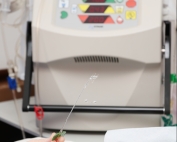
A Look at Home Hemodialysis
Hannah Bracamonte 2024-03-28T20:57:18-04:00 August 3rd, 2023 | Categories: Dialysis , eNews , Hemodialysis , Home Hemodialysis , Peritoneal Dialysis , Quality of Life , Treatment |
Summary by V. Scantlebury, MD, FACS Home dialysis modalities, which include home hemodialysis (HHD) and peritoneal dialysis (PD), offer several benefits for patients with end-stage kidney disease (ESKD). Home dialysis is associated with improvements in [...]

Travel Lovers, Don’t Let Dialysis Slow You Down
Hannah Bracamonte 2024-03-28T20:58:46-04:00 December 17th, 2021 | Categories: Home Hemodialysis , Peritoneal Dialysis , Quality of Life , The Kidney Citizen , Treatment |
By Vanessa Evans, Sr. Manager, Patient Communities and Advocacy at Fresenius Medical Care North America and DPC Board Member Brenda and Bernie Alvey are the consummate camper travelers, crisscrossing the United States and [...]
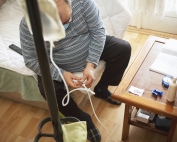
There Is No Place Like Home
Hannah Bracamonte 2024-03-28T20:59:12-04:00 April 19th, 2021 | Categories: Home Hemodialysis , Peritoneal Dialysis , The Kidney Citizen |
By Shaminder Gupta, MD, Nephrologist End Stage Renal Disease (ESRD) is a life changing diagnosis and impacts both the patient and the family. While waiting for renal transplantation, renal replacement therapy (RRT) is required to [...]

Participating in a Clinical Trial
Hannah Bracamonte 2024-03-28T20:59:56-04:00 August 21st, 2020 | Categories: Additional Resources , Early Intervention , eNews , Home Hemodialysis , In-Center Hemodialysis , Kidney Transplant , Peritoneal Dialysis , Treatment , Webinar |
New medical treatments and products are continually being developed for people living with kidney disease. Part of the development process for high quality, scientific, and safe options is through research to test the treatment or [...]

New Resources for Teens
Hannah Bracamonte 2024-03-28T21:00:27-04:00 March 2nd, 2020 | Categories: Additional Resources , Diagnosis of Kidney Disease , eNews , Fact Sheet , Home Hemodialysis , Humor and Laughter , In-Center Hemodialysis , Kidney Transplant , Lifestyle , Medication , Nutrition , Pediatric Kidney Disease , Peritoneal Dialysis , Stress Management , Support , Symptoms | Tags: cystinosis |
These booklets were developed for tweens and teens who learn their kidneys are not working and they will need dialysis or a transplant. The booklets provide a brief overview of coping with kidney disease, being [...]
Continue Reading About Dialysis
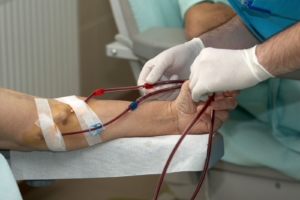
The primary treatment for ESRD, you can do dialysis at home or at a dialysis center.
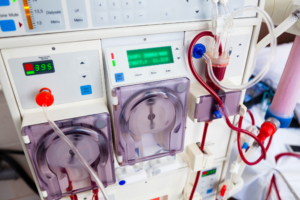
Hemodialysis can be performed in a dialysis center or in your home.

Peritoneal dialysis is performed in your home.
DPC Education Center
1012 14th St NW, Suite 1475 Washington DC, 20005
Phone: 1-855-291-3725
Fax: 1-888-423-5002
Email: [email protected]
Web: Dialysis Patient Citizens Education Center
Recent News
- Understanding the Impact of Phosphorus in Renal Patients
- DPC Raises Alarm on Health Workforce Shortages
- Recipe of the Month: Peach Cobbler
Join us May 2024 for 2 LIVE events on Instagram and Facebook!
- Wednesday May 15th @ 12:30pm EST: Facebook LIVE - Kidney Questions for the Doctor - RESCHEDULED Wednesday May 22nd @ 12:30pm EST: Instagram LIVE - Kidney Questions for the Doctor
These events are free and open to all. Please RSVP below to receive information on how to join.
First Name*
I am a... Chronic Kidney Disease (Pre-Dialysis) Patient Dialysis Patient Transplant Recipient Family Member Caregiver Healthcare Professional Friend Other...
Is this your first joining a DPC Ed Center LIVE event? Yes No
Join us on Thursday, May 25th at 12:30 PM Eastern on Facebook Live! The event is free and open to all. Please RSVP below to receive information on how to join.
Is this your first DPC Ed Center Webinar? Yes No
Join us on MONDAY, April 17th at 12:30 PM Eastern on Instagram Live! The Q&A session is free and open to all. Please RSVP below to receive information on how to join.
Join us on Thursday, March 23 for our webinar on Taking Care of Your Bones. The webinar is free and open to all. Please register below to be notified when learning session is released. THIS WEBINAR WILL BE AVAILABLE IN SPANISH WITH SLIDES IN BOTH SPANISH AND ENGLISH.
Acompañanos el jueves, 23 de marzo. Este seminario en línea es gratis y está abierto a todo las personas. Regístrate para notificarte cuando esté lista la sesión educativa.
Name/Nombre
Email/Correo electrónico*
I am a.../Soy... Dialysis Patient/Paciente en diálisis Caregiver or Family Member/Cuidador o Familiar CKD Patient/Paciente con Enfermedad Renal Crónica o Insuficiencia Renal Healthcare Professional/Profesional de la Salud Other.../Otro...
Is this your first DPC Ed Center Webinar?/¿Este es el primer seminario en línea del Centro Educativo de los Ciudadanos Pacientes en Diálisis (DPC, por sus siglas en inglés) que usted participa? Yes/Sí No
Join us on THURSDAY, September 23rd at 2:00 PM Eastern. The webinar is free and open to all. Please RSVP below to receive information on how to join.

Kidney Diet Tips
- DaVita® Medical Insights

Subscribe to Updates
Subscribe to receive email updates or manage your current email preferences.
Subscribe now
Recent Posts
- Try the new Feel-Good Foods Cookbook
- The Struggle to Juggle: Tips for Managing Multiple Diet Restrictions
- Vitamin D: The “Sunshine” Vitamin
- 8 Food Trends Made Kidney-Friendly: Part 2
- Recipes for Air Fryers, Pressure Cookers and More in Our Latest Cookbook
Recent Comments
- Jackie Termont, RD on Try the new Feel-Good Foods Cookbook
- Jackie Termont, RD on Baking Soda and Kidney Disease: Not Just for Baking and Cleaning (Part 1)
- Tehseen on Baking Soda and Kidney Disease: Not Just for Baking and Cleaning (Part 1)
- Kristin Troska on Try the new Feel-Good Foods Cookbook
- Diet Management
- Featured Post
- Holiday Meal Planning
- Kidney Health Tips
- On a Budget
- Uncategorized
- About Kidney Diet Tips
Peritoneal Dialysis Travel Tips
It’s summer time! In some places, like Houston where I live it’s been like summer since early May! This is the time to plan ahead for peritoneal dialysis travel. Think about visiting other places, taking time off from work, school, having fun at the beach, camping and swimming in the pool (for peritoneal dialysis patients– private pools only please).
Peritoneal Dialysis and Travel
Of course you can travel, by car, by plane, by train, by an RV, go ahead and take a trip, we all need a break from the routine. You still need to help your body clean the toxins by continuing your peritoneal dialysis (PD) treatments. You can take your peritoneal dialysis machine or you can do the manual exchanges that your PD nurse trained you to do. Always keep in mind safety. Carefully follow the same steps to do your PD exchanges as you were trained. Avoid infections at all cost, especially when you are traveling.
Here are some travel tips that may help you enjoy your travels:
- Always let your PD team know your plans. For example, your social worker can help you find a back-up dialysis center in your final destination. Back-up units are important because you never know if you may need to see a nurse or to get an important item that you forgot. Know the location of the nearest dialysis center in case you need help while on the road.
- Call your supplier to make sure they will deliver your PD dialysate bags on time and in the right place. Check with your PD nurse about any possible changes in your PD prescription.
- Check with your dietitian about best picks from fast food places and restaurants. When you are not home you are most likely going to eat out often. However, if you have a kitchenette in your hotel room, or are in an RV, or are visiting relatives or friends in a home, you may be able to prepare simple, delicious meals. Make them a part of spending time together.
Check DaVita.com for kidney-friendly recipes such as salads, entrees, soups and desserts.
For more kidney diet tips to help make traveling easier read these previous Kidney Diet Tips blog posts:
Nutrition on the Go: Top Travel Tips
7 Vacation Tips for Travelers on a Kidney Diet
10 Cruise Dining Tips for a Great Vacation
This article is for informational purposes only and is not a substitute for medical advice or treatment. Consult your physician and dietitian regarding your specific diagnosis, treatment, diet and health questions.

Matilde Ladnier RD, LD
Matilde is an adventurer who loves to cook, try new foods, travel (especially to her home country Peru) and play tennis. She has over twenty years of experience working with CKD patients and enjoys educating anyone who is willing to learn.
Challenged by the kidney diet?
Receive tips from dietitians to help you understand and manage all aspects of the kidney diet..
About Kidney Disease
- Kidney Disease Basics
- What is chronic kidney disease?
- Risk Factors
- Stages of Chronic Kidney Disease
- Related Diseases
- See All Articles ➜
- Kidney Care Vocabulary
- Education Videos
- Additional Resources
- Find a Kidney Smart® Class
- Kidney Disease Risk Quiz
- Food Analyzer
- Eating Out Guides
Kidney-Friendly Cookbooks
- Kidney Diet Videos
Home Dialysis
- Home Hemodialysis
- Peritoneal Dialysis
In-Center Dialysis Treatments
- In-Center Hemodialysis
- In-Center Nocturnal
- Interested in Transplant
- Care Partner
- Skilled Nursing Facilities
- Find Dialysis Center
- GFR Calculator
- Treatment Evaluator
- Integrated Kidney Care
Emergency Services
Travel support.
- Insurance & Financial Management
Prescription Management
Why Choose DaVita
- Request Insurance Advice
- Patient Payment Portal

- Kidney Smart Classes
- Kidney Friendly Cookbooks
- Find a Dialysis Center
- Why Choose DaVita?
- Health Portal
- Lab Results
- Health Records
- Patient Services
- People Finder
- Privacy & Settings
- Find a Center
- Medical Directorships
- Joint Ventures and Acquisitions
- Chronic Kidney Disease
- Clinical Leadership
- Clinical Approach
- Integrated Care
- CKD Patient Education
- Tools & Resources
- Clinical Quality
- Discharge Planning
- Health Plans
- Academic Medical Centers
- Kidney Health Education
- Life with Kidney Disease
Work and Travel on Dialysis
Will i have to quit work when i start dialysis.
Many people are able to continue working while on dialysis . Keeping your job can help provide benefits including income, health insurance and may also help maintain your self-esteem and friendships. Working on dialysis tends to pose two related challenges. The first challenge is scheduling your job, dialysis and the rest of your life so they don’t conflict. The second challenge can be figuring out which dialysis modality is best when you want to work but must be on dialysis.
If you choose in-center hemodialysis , talk with your nurse or social worker about scheduling your treatments so you miss as little work as possible. If you want more freedom in your dialysis schedule, you may ask if home dialysis is available in your area. You will need to consult with your doctor to determine if a home modality is right for you.
Choosing peritoneal dialysis or home hemodialysis , which are both types of home dialysis, may make it easier to work regular hours and perform dialysis. If you perform peritoneal dialysis and use an automated cycler at night while you sleep, you will be free of dialysis during the day. If you choose to do manual exchanges, you might need a half-hour break and a clean room to do an exchange during the work day.
Many people successfully work and get dialysis treatments. Upon starting dialysis, you may need a few weeks or months to adjust to dialysis, and then a period of working part-time before you get back up to speed. When you are ready, you should be able to return to work full-time.
Vacation planning on dialysis
Get away for awhile, visit friends and relatives or discover exciting destinations across the U.S. DaVita Guest Services Contact Center (GSCC) can help you locate a dialysis facility where you'll be staying. Call 1-800-244-0680 to arrange for dialysis while you travel. Your social worker can also help you arrange for dialysis treatment at a facility in the areas you will be staying.
It’s best to make travel arrangements early in advance, at least two months ahead of your travel, if possible, even earlier for popular destinations such as Florida and Las Vegas or at heavy travel times such as the holidays. Special trips, including cruises with a dialysis medical team onboard, are also an option for many people on dialysis.
Your dialysis center can forward a copy of your dialysis prescription and other records to the center you will visit. It is also a good idea to carry a copy of your medical information with you and to call ahead to be sure the center you will be visiting has all the information they need. Call to confirm your appointment when you arrive at your destination.
If you have Medicare and travel in the United States, Medicare will pay its usual portion of your hemodialysis costs. Private insurance will also generally pay for dialysis treatments you receive away from home, but you should contact your insurance provider in advance of your travel to confirm your coverage benefits. Some plans will even provide coverage for overseas treatments. The exception is managed care, which may not pay for treatments outside of your home area. However, if you have managed care and Medicare, Medicare will typically cover 80% of the treatment cost, leaving you with a much smaller bill. Check with your insurance provider to find out details of what is covered when you travel.
If you do peritoneal dialysis (PD) , you can take your supplies with you, or have them shipped to your destination. If you are on Medicare and are traveling outside the United States, Medicare may not cover the cost of the dialysis solution. Check with your PD nurse . Call before you leave home to be sure that your supplies have arrived. Your PD nurse can help you learn safe ways to do your exchanges while camping or taking a driving trip.
With resourcefulness and determination, you may be able to travel on dialysis.
Just because you are on dialysis does not mean you have to cut out important activities such as work and travel. To many people, whether on dialysis or not, work is a great outlet to feel like an important provider and contributor to society. Travel is also an excellent way to get out and break up a weekend, visit friends and relatives far away or experience new adventures. Both work and travel do not have to be hindered if you are on dialysis. Talk to your doctor about your lifestyle and choose a dialysis modality that helps you live your life to the fullest.
Take a Deeper Look at Treatment & Services
Dialysis Treatments
Get an overview about different dialysis treatments and how they help people continue a productive life.
Understand the benefits of home dialysis, whether it’s peritoneal dialysis (PD) or home hemodialysis (HHD).
Insurance Coverage for Dialysis
When you are diagnosed with kidney disease and need dialysis or a transplant, you’ll want to understand your insurance options, how to receive financial assistance and more.
Understand how to keep track of your prescribed medications.
From tips to helping set up treatments when you travel, DaVita has resources to keep you on the move.
When you need emergency support or dialysis placement, look no further than DaVita ® Guest Services.
Quality Programs
See how the Centers for Medicare and Medicaid Services (CMS) recognized many DaVita centers with top marks in its Five-Star Quality Rating program.
Better Care with DaVita
With a kidney disease diagnosis, what do you do next? Find your way to better care in 3 steps.

IMAGES
VIDEO
COMMENTS
Start here. Many people who receive dialysis can travel while continuing their treatments; however, you may have specific requirements not listed in this article. Discuss travel plans with your doctor and follow their guidance. Once you have the green light from your care team, here are six ways to prepare for your trip:
If you run into challenges, call your doctor or social worker for guidance. You can also call the Fresenius Kidney Care Patient Travel Services team at 1-866-434-2597 (option 2), Monday - Friday. Dialysis travel can take some planning. Learn what to expect and what to pack. Plus, get free support from our Patient Travel Services.
Pros: Most people said they can and do enjoy traveling while on dialysis. Some who dialyze in-center ask their dialysis social worker to schedule treatment appointments in centers near their destination, while people on home hemodialysis and peritoneal dialysis (PD) travel with their equipment. People who dialyze at home order their dialysis ...
DaVita® has more than 2,500 dialysis centers nationwide, and they are available to travelers regardless of where you normally dialyze. Here are two ways to get started: Locate dialysis where you need it. Find a Dialysis Center is a tool you can use to map out your visit. Call DaVita Guest Services at 1-800-244-0680.
If you have a manual wheelchair, an electric wheelchair or a scooter, notify your airline that you are traveling with these items and will need "maximum assistance" at the airport. Call DaVita Guest Services at 1-800-244-0680 at least three months before your trip to receive travel assistance. Find a DaVita home dialysis program.
Available from Dialysis & Transplantation, 7628 Densmore Ave., Van Nuys, CA 91406-2088. Ask your dialysis center for a copy. Some companies specialize in vacation and travel planning for people on dialysis, such as cruises, foreign travel and wilderness travel. There are camps for people on dialysis and transplant — for both adults and children.
For domestic travel, start making arrangements with a dialysis center in the city you are planning to visit at least 30 days before departure. For foreign travel, getting started even earlier is a good idea. Generally, dialysis centers are welcoming to travelers, within the context of their capacities. Patients know how hard it is to secure ...
Call 1-800-244-0680 and provide contact information for the overseas center you plan to visit. They will contact the dialysis center and fax your necessary paperwork, including: Name, address, phone number; Recent physical exam, lab and dialysis treatment reports; Type of dialysis access; Special medical needs; List of medicines you take
Traveling While on Peritoneal Dialysis (PD) Because peritoneal dialysis (PD) patients can frequently have their supplies delivered to their travel destination, they often only need to bring their cycler (if they're on Automated Peritoneal Dialysis). This means that it is typically easier to travel on PD than other types of dialysis.
Options for Traveling on Dialysis. One option for traveling on dialysis is to use a home dialysis unit. A home dialysis unit is a small, portable dialysis machine that can be used in a hotel room or even on an airplane. Home dialysis units allow you to have more control over your dialysis treatments and may make traveling easier.
Treatment coordination services are provided free of charge for those currently using Fresenius Medical Care centers and those who would like to use our services while traveling. To start planning for your travel needs, call 1-866-434-2597 (option 2), Monday - Friday, or fill out the form below and one of our team members will contact you.
Three Tips for Traveling While on Dialysis. Thanks to portable equipment and access to DaVita ® dialysis centers nationwide, traveling on dialysis can be easier. It's important to stay on top of your health while you travel. Take note of these three steps to help plan a successful, kidney-friendly trip: 1. Think ahead for mealtime and snacks.
You can also carry written prescriptions as a safeguard too. Health Systems Management, a dialysis management company, is based in Tifton, Georgia. Our company provides turnkey dialysis management services to Atrium Health Wake Forest Baptist dialysis clinics in North Carolina and Emory Healthcare dialysis clinics in the Atlanta, Georgia area.
Since we don't know which centers require extra tests until they are contacted, it is important that you begin your travel planning about 4 weeks in advance. Medicare will pay for dialysis anywhere in the USA. They do not pay for dialysis on a Dialysis Cruise Ship. If you would like to travel to Canada or Mexico, some patients have found it ...
AAKP interviewed international dialysis nurse, Barbara Wallace, co-owner of Irish Holiday Dialysis, to learn about important things to consider when planning a trip abroad including a Top 10 List, which you will find highlighted below.
If you're looking to travel locally around Australia, then the Big Red Kidney Bus program can help you to explore and stay on top of your home haemodialysis treatment. The Bus is available for all dialysis patients, all over Australia. It travels to popular tourist locations throughout regional New South Wales and Victoria.
Here is a list of 10 holiday destinations for DaVita dialysis patients. 1. Las Vegas, Nevada. Viva Las Vegas! The desert oasis is a top travel spot for dialysis patients. From countless themed hotels and casinos, to the endless array of shows and world-class dining, Las Vegas is the ultimate place to ring in the New Year.
Travel Decisions. The next step is determining if you are going to travel with your dialysate solution or have it shipped to your destination. If you choose to have it shipped to your destination you will need to give at least 2 weeks' notice to your supplier and notify your hotel to expect your packages and ensure you have a room that will ...
People on dialysis can enjoy different types of vacations. You can set sail on a cruise ship, book a vacation abroad, road trip across the country, or visit famous attractions and entertainment spots. Whether you are on in-center hemodialysis, home hemodialysis (HHD), peritoneal dialysis (PD) or in-center nocturnal dialysis, there are vacation ...
Peritoneal Dialysis and Travel. Of course you can travel, by car, by plane, by train, by an RV, go ahead and take a trip, we all need a break from the routine. You still need to help your body clean the toxins by continuing your peritoneal dialysis (PD) treatments. You can take your peritoneal dialysis machine or you can do the manual exchanges ...
Vacation planning on dialysis. Get away for awhile, visit friends and relatives or discover exciting destinations across the U.S. DaVita Guest Services Contact Center (GSCC) can help you locate a dialysis facility where you'll be staying. Call 1-800-244-0680 to arrange for dialysis while you travel. Your social worker can also help you arrange ...